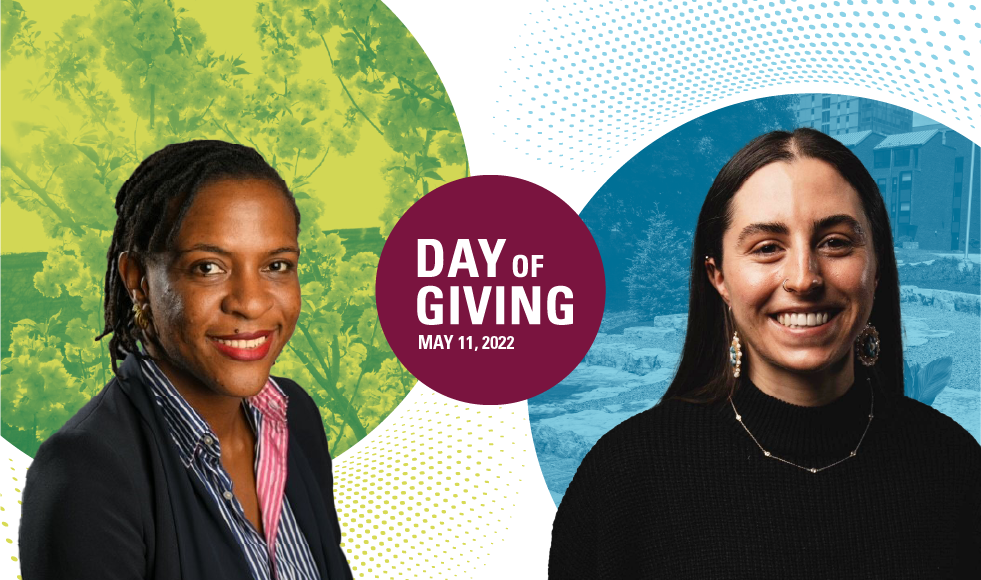Storytelling project highlights unique experiences of Black, Indigenous students

Stories are at the heart of the human experience.
Now a new digital storytelling project, developed in celebration of McMaster’s inaugural Day of Giving, is centralizing the stories and voices of Black and Indigenous students.
“We wanted to include students in meaningful ways,” says Selina Mudavanhu, an assistant professor in McMaster’s Department of Communication Studies and Media Arts who led the project. “It’s really important that students’ voices are heard. Part of doing that involves providing a space for them to share their own stories and experiences.”
May 11 is McMaster’s Day of Giving, a university-wide fundraising campaign focused on supporting Black student excellence, Indigenous priorities and equity-deserving students at McMaster. Learn more or make a gift.
Mudavanhu’s work is centred on analyzing content mediated by mainstream media, as well as teaching Black and racialized students to use widely available digital tools to tell stories about their lives and experiences.
“It’s about agency,” says Mudavanhu. “It’s about giving students back the power to tell their own stories, in their own voices and in the ways they choose, without trained communications professionals or journalists mediating the process.”
Working in collaboration with Katherine Knott, Elder-in-Residence at Indigenous Student Services, Mudavanhu hosted two workshops with Black and Indigenous students. The first introduced students to the concept of storytelling and to a range of open-source digital technologies and resources, the second focused on story creation – a process that Mudavahnu says was enriched by the participation of Elder Knott.
“Storytelling is important to me as an Indigenous elder,” says Elder Knott. “It is our way of connecting within our community and to support learning about life values and experiences.”
“The opportunity to be part of these workshops allowed me to validate and support the individuals wanting to tell their stories.”
The result was a series of thoughtful and touching stories that reflect the unique experiences of the student storytellers. The vignettes were not intended to represent the students’ full experiences but were created to capture the stories they wanted to share in the context of Day of Giving.
“Having your voice respected builds confidence,” says Elder Knott. “These short stories empower the individual and validate their experience while giving them the chance to acknowledge the contributions of the donors.”
“We encourage the students not to worry about perfection in terms of the technical aspects of constructing stories – that is not the focus of digital storytelling,” stresses Mudavanhu. “The focus is on centralizing their voices, their experiences, and choosing what stories they want to share at a particular moment in time.”
“Everyone has a story to tell,” she says.
Sage Hartman, Psychology, Neuroscience and Behaviour, minors in Community engagement and Indigenous Studies
I honestly think that Mac provided me with the spaces to pursue my interests and turn my passions into something beautiful … Over the last few years, combinations of smaller and larger scholarship opportunities have helped me pay my tuition, in turn, relieving some stress and allowing me to further focus on my studies and my personal growth.”
Anonymous
It’s very tough to be an African student in a first-world country. When you arrive everything costs double to 10 times what it would cost where I am from … at some point I was in deep credit card debt just trying to pay for my studies. A year later, McMaster’s funding assisted me. It was like a miracle.”
Sandra Ofori, PhD candidate, Health Research Methodology (Clinical Epidemiology)
“Receiving funding to support my studies has significantly increased my commitment to academic excellence. It signals to me that someone is invested in my success and that spurs me on. It is especially important for Black students like myself who are new immigrants and have not established the social network or social support system in a new community.”
Anonymous
“My great-grandmother was forced to attend residential school, and this is where all cultural transmission in my family ceased. Half of my identity was stolen from me before I was even born. But through McMaster I was able to begin to learn my language, spirituality, history, and start my journey of reconnection and revitalization.”
Click here to check out the full entry in the digital storytelling project



